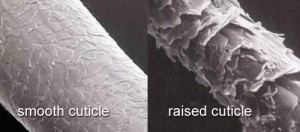Frizzy or Unruly Hair
Frizzy or unruly hair is a problem familiar to many, especially those that have naturally curly hair, frequently use hot styling tools, or live in humid climates. Frizz occurs when the hair cuticle becomes raised, allowing moisture to pass through and swell the strands. The hair can no longer lie flat, which leads to the frizzy appearance. The cuticle can be damaged by a variety of elements or the hair can simply be dehydrated.
Some of the most common factors that affect frizziness:
Dry hair: Hair can become dehydrated for a variety of reasons, including not drinking enough water, shampoos that are excessively drying or used too frequently, insufficient use of conditioners (or deep conditioning treatments for hair that is susceptible to dryness), or medications and hormonal changes that can affect your natural moisture production. Consult a hair professional to get the best advice about the ideal in-salon treatments for your hair and to develop a proper hair regimen at home with products that meet your specific hair needs.
Curly hair: Those with naturally curly hair are especially susceptible to frizz because of the hair structure. Due to its shape, a curled strand of hair has an uneven distribution of oils on the hair shaft. This leads to parts of the hair being dry and causes frizziness.
Frequently colored hair: For those that color their hair at home or have frequent color changes (especially involving bleach), it will come as no surprise that color processes dry your hair. It is important to always consult with a color professional who can recommend the correct course of action, whether it involves an at-home regimen or relevant treatments.
Chemical treatments: Besides color processes, treatments like straighteners, perms, and relaxers can damage your hair if not administered properly. The basic idea of these treatments is using heat and/or chemicals to break down bonds within your hair structure so they can be reformed in a new shape. Be sure to seek the advice of a hair professional so they can ensure the treatment is performed safely and advise you on the best way to maintain your hair afterwards.
Frequent use of hot styling tools: If you must use a blow dryer or flat iron daily, try to avoid using the highest heat setting. The heat is what causes damage to the cuticle and dries hair out. Adding a diffuser to your blow dryer can greatly reduce the amount of frizz, especially for those with curly hair.
Mechanical damage: You’ve probably already heard that towel-drying your hair is bad. The same goes for over-brushing dry hair, keeping your hair in tight ponytails or updos, or using damaging hair ties. These practices disrupt the hair cuticle and potentially lead to breakage. Instead of vigorously towel-drying your hair, try to lightly blot your wet hair with a fresh towel (avoid rubbing!) and then let air dry. If you must comb your dry hair, try to use your fingers or a boar bristle brush that helps to distribute the natural oils in your hair to keep it healthy.
Exposure to the elements: Humidity is not the only environmental factor that can cause frizzy hair. Strong wind, saltwater or chlorinated water, and too much sun can all damage your hair. They all weaken your hair’s ability to retain moisture, so your best bet is to keep your hair as protected as possible.
